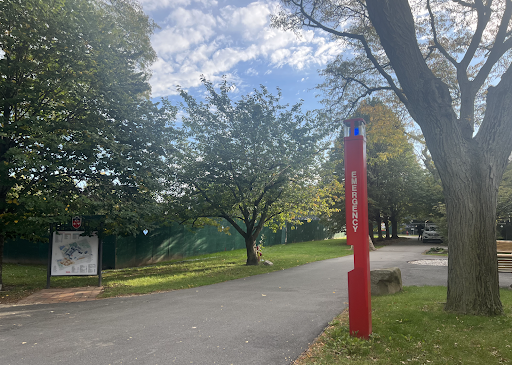
Attending a college campus located in New York City can come with risks. Crime rate is double the percentage in urban areas, the homeless population is greater, including almost 100,000 people, and there is even potential crime on campus as shown by Public Safety’s email briefings.
St. John’s University has several programs enforced by Public Safety to protect students, ranging from shuttle services transporting students safely to a blue light system — which allows students to call Public Safety at the touch of a button. The shuttle services pick up and drop off from 7 a.m. to 3 a.m. on weekdays, and 6 p.m. to 3 a.m. on weekends. Locations include the Jamaica LIRR Station, F Train-Homelawn Street/Hillside Avenue, Henley Road Residence, Gate 1, Public Safety/ROTC Building, Seton Complex and DePaul Houses.
“St. John’s University is a safe campus. I really don’t have any concerns for students when they are on campus,” Denise Vencak, the executive director of public safety and risk management, said in a statement to The Torch. “We do recommend that all students download the LiveSafe app, which allows them to have direct contact with Public Safety and 911.”
Vencak continued to state that “Public Safety would like to remind all students that safety is a team effort. Students are encouraged to report suspicious activity to Public Safety so that a proper inquiry can be conducted.”
The only safety concern mentioned by Vencak are “phishing” emails that appear to have been sent by the University or other students, but are actually scams attempting to access students’ bank accounts. Vencak explained the phenomenon, and advised students to ignore these emails and contact Public Safety.
“Students, faculty and employees have been the recipients of phishing emails and on occasion have responded,” Vencak said. “The email will often offer a remote job in which you will receive a check to deposit and then return a portion of the money via a banking app such as Zelle, Venmo or by purchasing gift cards and forwarding the numbers on the rear of the card.”
Despite the safety protocols ensured by Vencak and the University-wide systems, many students still feel unsafe on campus.
“Most of the time, being around large groups of guys at night when I’m alone can be intimidating,” said junior Sanjana Liliah, who is a commuter. “I also don’t like that it’s an open campus because it means that anyone can walk on to campus who can be potentially threatening.”
Another junior, Alexia Autera, shared similar sentiments about the campus gates. “There should be more security at the gates since they are always open and no one is ever really there. Anyone can just walk in.”
“I think that the campus should be better lit at night,” said junior Audrey Mendez. “I feel like there are certain areas that lack lighting and can be uncomfortable to walk through.”
Aside from Public Safety, there are many other ways to keep yourself safe on campus. The Citizen app is a program that provides alerts of crimes or safety incidents in your surrounding neighborhood. Providing information such as location, descriptions of the incident, soundbites and updates on first responders, the app is a useful tool to be aware of potential local crime.
Students should also practice safety habits such as walking in groups, sharing your location with trusted friends and sticking together if venturing off campus. Carrying safety alarms, such as the Birdie, can also help students feel protected on and off campus. The Birdie, when set off, produces a loud sound that can alert people around you if you feel unsafe.
Public Safety can be contacted at 718-990-5252 and the number is located on students’ Stormcards.








